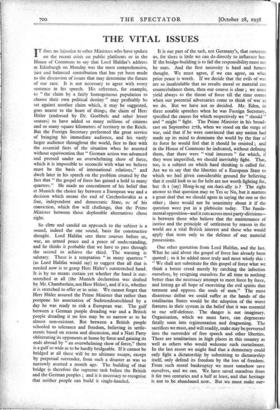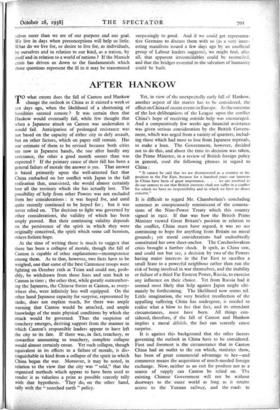THE VITAL ISSUES
TT does no injustice to other Ministers who have spoken I on the recent crisis on public platforms or in the House of Commons to say that Lord Halifax's address at Edinburgh on Monday was the most comprehensive, just and balanced contribution that has yet been made to the discussion of issues that may determine the future of our race. It is not necessary to agree with every sentence in his speech. His reference, for example, to " the claim by a fairly homogeneous population to choose their own political destiny " may profitably be set against another claim which, it may be suggested, goes nearer to the heart of things, the claim of Herr Hitler (endorsed by Dr. Goebbels and other lesser orators) to have added so many millions of citizens and so many square kilometres of territory to the Reich. But the Foreign Secretary performed the great service of bringing his immediate audience, and his vastly larger audience throughout the world, face to face with the essential facts of the situation when he asserted without equivocation that " German action was advanced and pressed under an overwhelming show of force, which it is impossible to reconcile with what we believe must be the basis of international relations," and dwelt later in his speech on the problem created by the fact that " the gospel of force has gained a hold in many quarters." He made no concealment of his belief that at Munich the choice lay between a European war and a decision which meant the end of Czechoslovakia as a free, independent and democratic State, or of his conviction, which few will challenge, that the Prime Minister between those deplorable alternatives chose right.
So clear and candid an approach to the subject is a sound, indeed the one sound, basis for constructive thought. Lord Halifax sees three courses before us, war, an armed peace and a peace of understanding, and he thinks it probable that we have to pass through the second to achieve the third. The warning is salutary. There is a temptation " in many quarters " (as Lord Halifax would say) to suggest that all that is needed now is to grasp Herr Hitler's outstretched hand. It is by no means certain yet whether the hand is out- stretched at all (the Munich declaration was drafted by Mr. Chamberlain, not Herr Hitler), and if it is, whether it is stretched to offer or to seize. We cannot forget that Herr Hitler assured the Prime Minister that rather than postpone his annexation of Sudetendeutschland by a day he was ready to risk a European war. The gulf between a German people dreading war and a British people dreading it no less may be so narrow as to be almost non-existent. But between a British people schooled to tolerance and freedom, believing in settle- ments based on reason and discussion, and a Nazi Party obliterating its opponents at home by force and gaining its ends abroad by " an overwhelming show of force," there is a gulf so wide as to be hardly bridgeable. If it cannot be bridged at all there will be no ultimate escape, except by perpetual surrender, from such a disaster as was so narrowly averted a month ago. The building of that bridge is therefore the supreme task before the British and the German peoples ; and it is necessary to recognise that neither people can build it single-handed. It is our part of the task, not Germany's, that concerns us, for there is little we can do directly to influence her. If the bridge-building is to fail the responsibility must not be ours. And the first necessity is hard and honest thought. We must agree, if we can agree, on what price peace is worth. If we decide that the evils of war are so incalculable that no results moral or material can counterbalance them, then our course is clear ; we must yield always to the threat of force till the time comes when our potential adversaries come to think of war as we do. But we have not so decided. Mr. Eden, in three notable speeches when he was Foreign Secretary, specified the causes for which respectively we " should " and " might " fight. The Prime Minister in his broad- cast on September 27th, when we stood on the verge of war, said that if he were convinced that any nation had made up its mind to dominate the world by the fear of its force he would feel that it should be resisted ; and in the House of Commons he indicated, without defining them, that there were " vital interests " for which, if they were imperilled, we should inevitably fight. That, too, is a subject on which hard thinking is called for. Are we to say that the liberties of a European State to which we had given considerable ground for believing that it could look to us for help are not worth fighting for, but i h t (say) Hong-kc ng em thatic ally is ? The right answer to that question may be Yes or No, but it matters a great deal that we should agree in saying the one or the other ; there would not be unanimity about it if the question were put in a plebiscite today. The funda- mental opposition—and it cuts across most party-divisions- is between those who believe that the maintenance of justice and the principle of settlement by reason in the world are a vital British interest and those who would apply that term only to the defence of our material possessions.
One other quotation from Lord Halifax, and the last. What he said about the gospel of force has already been quoted ; to it he added most truly and most wisely this : " We shall not substitute for this gospel of force what we think a better creed merely by catching the infection ourselves, by resigning ourselves for all time to nothing better than the necessary attempt to meet force by force, and letting go all hope of exorcizing the evil spirits that torment and oppress the souls of men." The most disastrous defeat we could suffer at the hands of the totalitarian States would be the adoption of the worst features in their system in the belief that it was essential to our self-defence. The danger is not imaginary. Organisation, which we must have, can degenerate fatally soon into regimentation and dragooning. The sacrifices we must, and will readily, make may be perverted into the surrender of free speech and other liberties. There are totalitarians in high places in this country as well as others who would welcome such curtailment. In the last resort we might find that a democracy could only fight a dictatorship by submitting to dictatorship itself, only defend its freedom by the loss of freedom. From such moral bankruptcy we must somehow save ourselves, and we can. We have saved ourselves from it for two centuries and a half at least, and that heritage is not to be abandoned now.. But we must make our- selves surer than we are of our purpose and our goal. We live in days when preconceptions will help us little. What do we live for, or desire to live for, as individuals, by ourselves and in relation to our kind, as a nation, by itself and in relation to a world of nations ? If the Munich crisis has driven us down to the fundamentals which those questions represent the ill in it may be transmuted surprisingly to good. And if we could get representa- tive Germans to discuss them with us (as a very inter- ' esting manifesto issued a few days ago by an unofficial group of Labour leaders suggests), we might find, after all, that apparent irreconailables could be reconciled, and that the bridges essential to the salvation of humanity could be built.

























































 Previous page
Previous page